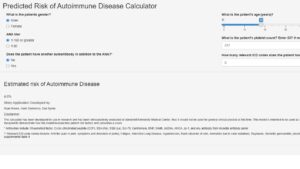The Autoimmune Disease Risk Prediction Tool, developed by Vanderbilt University Medical Center, is a free, web-based application designed to help users estimate their risk of developing autoimmune diseases. Created by the Center for Quantitative Sciences at Vanderbilt, the tool leverages data from large-scale clinical and genetic studies to generate individualized risk predictions based on user inputs.
By entering basic demographic information and answering health-related questions—including family history, symptoms, and lifestyle factors—users receive a personalized score that reflects their likelihood of autoimmune disease development. The tool focuses on early identification and awareness, providing users with a data-driven starting point for proactive healthcare decisions.
This predictive model is especially useful for individuals with vague or overlapping symptoms—such as fatigue, joint pain, or skin issues—that may be early indicators of conditions like lupus, rheumatoid arthritis, Hashimoto’s thyroiditis, or type 1 diabetes. While not intended to replace clinical diagnosis, the tool offers an accessible and scientifically grounded method for self-screening and awareness.
Healthcare professionals can also use the platform to support patient education and early intervention strategies, helping patients understand when further testing or specialist referrals may be necessary.
The interface is intuitive and user-friendly, making it easy for both the general public and clinicians to navigate. The tool emphasizes data privacy and does not collect identifying information, allowing users to explore their risk safely and anonymously.
As autoimmune diseases continue to rise globally, this tool represents a promising advance in digital health innovation—bridging the gap between population-level research and personalized preventive care. It empowers users to become active participants in their health journey and supports the broader goal of early detection and improved outcomes in autoimmune medicine.

